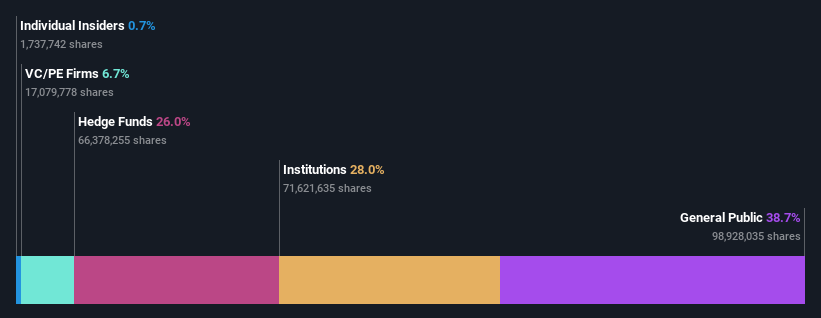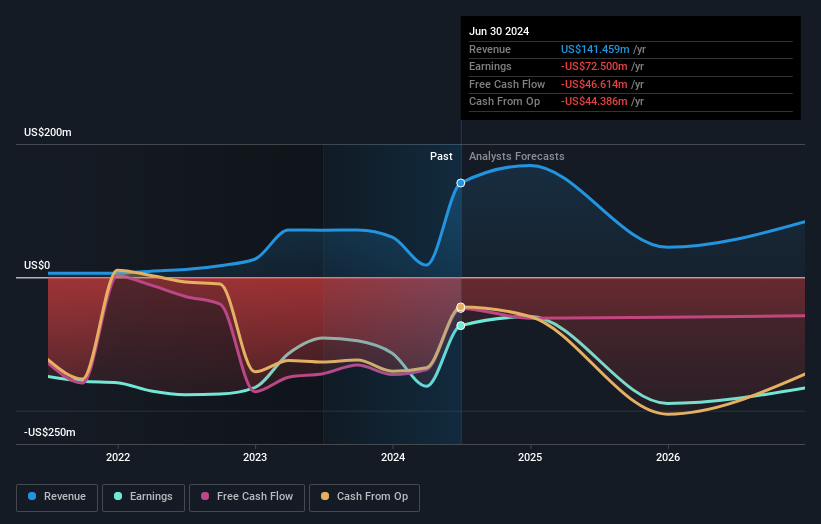- United States
- /
- Biotech
- /
- NasdaqGS:ADAP
Painful week for retail investors invested in Adaptimmune Therapeutics plc (NASDAQ:ADAP) after 11% drop, institutions also suffered losses

Key Insights
- Significant control over Adaptimmune Therapeutics by retail investors implies that the general public has more power to influence management and governance-related decisions
- 52% of the business is held by the top 8 shareholders
- Institutional ownership in Adaptimmune Therapeutics is 28%
If you want to know who really controls Adaptimmune Therapeutics plc (NASDAQ:ADAP), then you'll have to look at the makeup of its share registry. The group holding the most number of shares in the company, around 39% to be precise, is retail investors. That is, the group stands to benefit the most if the stock rises (or lose the most if there is a downturn).
While institutions, who own 28% shares weren’t spared from last week’s US$23m market cap drop, retail investors as a group suffered the maximum losses
Let's delve deeper into each type of owner of Adaptimmune Therapeutics, beginning with the chart below.
View our latest analysis for Adaptimmune Therapeutics

What Does The Institutional Ownership Tell Us About Adaptimmune Therapeutics?
Institutional investors commonly compare their own returns to the returns of a commonly followed index. So they generally do consider buying larger companies that are included in the relevant benchmark index.
Adaptimmune Therapeutics already has institutions on the share registry. Indeed, they own a respectable stake in the company. This can indicate that the company has a certain degree of credibility in the investment community. However, it is best to be wary of relying on the supposed validation that comes with institutional investors. They too, get it wrong sometimes. If multiple institutions change their view on a stock at the same time, you could see the share price drop fast. It's therefore worth looking at Adaptimmune Therapeutics' earnings history below. Of course, the future is what really matters.

Our data indicates that hedge funds own 26% of Adaptimmune Therapeutics. That catches my attention because hedge funds sometimes try to influence management, or bring about changes that will create near term value for shareholders. Matrix Capital Management Company, LP is currently the company's largest shareholder with 15% of shares outstanding. EcoR1 Capital, LLC is the second largest shareholder owning 11% of common stock, and New Enterprise Associates, Inc. holds about 6.7% of the company stock.
On further inspection, we found that more than half the company's shares are owned by the top 8 shareholders, suggesting that the interests of the larger shareholders are balanced out to an extent by the smaller ones.
While studying institutional ownership for a company can add value to your research, it is also a good practice to research analyst recommendations to get a deeper understand of a stock's expected performance. Quite a few analysts cover the stock, so you could look into forecast growth quite easily.
Insider Ownership Of Adaptimmune Therapeutics
The definition of an insider can differ slightly between different countries, but members of the board of directors always count. Management ultimately answers to the board. However, it is not uncommon for managers to be executive board members, especially if they are a founder or the CEO.
Most consider insider ownership a positive because it can indicate the board is well aligned with other shareholders. However, on some occasions too much power is concentrated within this group.
Our most recent data indicates that insiders own less than 1% of Adaptimmune Therapeutics plc. It appears that the board holds about US$1.4m worth of stock. This compares to a market capitalization of US$201m. We generally like to see a board more invested. However it might be worth checking if those insiders have been buying.
General Public Ownership
With a 39% ownership, the general public, mostly comprising of individual investors, have some degree of sway over Adaptimmune Therapeutics. While this size of ownership may not be enough to sway a policy decision in their favour, they can still make a collective impact on company policies.
Private Equity Ownership
With a stake of 6.7%, private equity firms could influence the Adaptimmune Therapeutics board. Some investors might be encouraged by this, since private equity are sometimes able to encourage strategies that help the market see the value in the company. Alternatively, those holders might be exiting the investment after taking it public.
Next Steps:
I find it very interesting to look at who exactly owns a company. But to truly gain insight, we need to consider other information, too. Consider for instance, the ever-present spectre of investment risk. We've identified 4 warning signs with Adaptimmune Therapeutics (at least 1 which is potentially serious) , and understanding them should be part of your investment process.
But ultimately it is the future, not the past, that will determine how well the owners of this business will do. Therefore we think it advisable to take a look at this free report showing whether analysts are predicting a brighter future.
NB: Figures in this article are calculated using data from the last twelve months, which refer to the 12-month period ending on the last date of the month the financial statement is dated. This may not be consistent with full year annual report figures.
New: Manage All Your Stock Portfolios in One Place
We've created the ultimate portfolio companion for stock investors, and it's free.
• Connect an unlimited number of Portfolios and see your total in one currency
• Be alerted to new Warning Signs or Risks via email or mobile
• Track the Fair Value of your stocks
Have feedback on this article? Concerned about the content? Get in touch with us directly. Alternatively, email editorial-team (at) simplywallst.com.
This article by Simply Wall St is general in nature. We provide commentary based on historical data and analyst forecasts only using an unbiased methodology and our articles are not intended to be financial advice. It does not constitute a recommendation to buy or sell any stock, and does not take account of your objectives, or your financial situation. We aim to bring you long-term focused analysis driven by fundamental data. Note that our analysis may not factor in the latest price-sensitive company announcements or qualitative material. Simply Wall St has no position in any stocks mentioned.
About NasdaqGS:ADAP
Adaptimmune Therapeutics
A clinical-stage biopharmaceutical company, provides novel cell therapies primarily to cancer patients in the United States and the United Kingdom.
Undervalued with adequate balance sheet.


